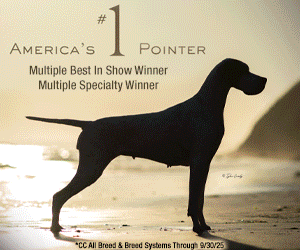The Future of Purebred Dogs
Click here to read the complete article
By Dr. Gerry G. Meisels
This Thanksgiving I was sitting contentedly with my family after a sumptuous Turkey dinner with all the fixings. The bird had been done just right, the stuffing was out of this world, and there was plenty of one of my favorites, grapefruit Jello salad. Our two granddaughters and their parents had done the dishes, and we started to relax in front of the TV. Flipping through channels, with all of us real dog people, we stopped when a three-legged dog hopped across the screen. A rescue dog, we heard. What a nice thing that someone cared enough to give this dog a good life. Fascinatedly we stopped on that channel and watched a parade of various other similarly afflicted dogs with the pitch for rescue dog and especially shelter dog adoption increasing in intensity. Well-known performers made cameo appearances with that pitch. This was in prime time but not on a regular network channel. They were heart-wrenching stories, with tremendous emotional appeal for any compassionate person and animal lover. The message, beyond the obvious, was that breed did not matter.
This was not a unique event, similar promotions are all over the country and even major dog food companies include such messages in their ads – no wonder, perhaps 80 to 90% of our country’s 80 million dogs are not purebred. Corporations are there to make money, and the bigger market provides more sales opportunities. There is no significant countervailing message probably for a variety of reasons. Money is certainly a major factor, but so is the lack of the intense emotional appeal of a saved rescue dog who would have suffered or died without the kindness of an adopting family.
In a nation that roots for the underdog, all this is not surprising. Our culture has changed in my lifetime and yours. Among many other changes, we have become much more focused on the return on our investment, on what we get for what we pay. Getting a slip of paper that certifies our dog’s pedigree no longer seems like much of a deal. Instant communication with our smartphones and tablets with access to the web anytime from anywhere contributed to the decline in face-to-face interaction, and while a framed AKC registration slip on the wall was once seen by many and projected an image of success and desirability, if no one comes to your house there is no one to whom to show the slip. Americans now eat one-third of their meals outside their home. The increasing diversity of the US population with much of our growth in groups under-represented in purebred dog ownership may also be a contributor. But even more important than all that has been the heavy promotion of adoption of rescue and shelter dogs, and certainly the animal rights movement and its very effective, well-funded and well-designed promotional strategies. We purebred dog lovers have unwittingly contributed by our own emphasis on rescue, and by giving the AR folks ammunition with the health issues of some breeds where appeal in the show ring trumps physical well-being. These days, more often than not, we hear people speak with great pride of having adopted a rescue or shelter dog; doing so has climbed way up on the prestige ladder. That even puts us purebred dog owners, breeders, and sports enthusiasts on the defensive. Finally, one can argue that we have contributed to it ourselves through changes in the way our principal window to the public, our conformation dog shows, have been organized more and more for the benefit of clubs and exhibitors rather than as the public display of what purebred dogs are all about: predictability of their appearance, temperament, and abilities. We have no effective way of reversing these trends but our planning should take our changed culture and the changes in values into account.
These are some of the underlying reasons why AKC registrations have declined steadily over the last 20 years. It isn’t just the competing registries, which have also seen declines according to an informed source. Do these reasons allow us to project the future and maybe even think of strategies to influence it? This is anything but an easy task. “It is always wise to look ahead, but difficult to look further than you can see.” (Winston Churchill), yet “If you don’t think about the future you won’t have one.” (author unknown). The easiest way to look at the future is to assume it will be just like the present or the recent past. That is, however, the worst mistake we can make because we know all too well that the only thing in life that never changes is change itself. The trick to good planning is to try to surmise the direction in which the future is moving from the experience of the past and a careful analysis of the present.
Gazing into that crystal ball suggests that, if left alone, it will get worse and may never get better. The lingering remnants of the great recession of 2008 combined with unintended consequences of legislation such as the affordable care act and perhaps even free trade agreements are leading to an increasing reduction in the availability of discretionary money by the middle and working classes, i.e. money not needed for the essentials such as housing, food, clothing and transportation. That the middle class is shrinking has been said so many times it is almost proverbial. Couple this with the increasing competition for discretionary funds from modern technologies. Just look back a decade or so ago – where were such household items as GPS, smart phones, cell phones, and tablets? Acquiring any of these provides immediate gratification, an expectation of most people. Contrast that to purebred dogs: the difference between a pound puppy and a purebred puppy shows up when these puppies grow up many months in the future. All puppies are cute, but what will they be like a year or two later? What will be their health problems? There is so much misinformation around such as that mixed breed dogs are healthier, long proven wrong by reliable research. But facts available in a veterinary- or dog-related publications will not change popularly held views promoted by effective organizations. In any event, facts alone do not change such views, just think of the deniers of climate change. The needed high-impact emotional appeal cannot be generated without the kind of drama to which the truth does not lend itself very well.
Knowing that times are tough and that we cannot change our society’s culture is no reason to despair. We can deal with the changed environment realistically. Even within today’s culture there are many pockets of people who appreciate things that are not in the mainstream of our population. For example, baroque music, classical music, and opera are appreciated mostly by a small fraction of Americans. But those who appreciate it have created an aura that is recognized and respected, it makes up in quality and resources of their aficionados what they lack in numbers. It is a model we can follow. When you explain to acquaintances what you have in dogs and for what you aim, it becomes clear that we already have an aura. We must have the courage to promote it and the commitment to provide the resources necessary to do it. It will take a coordinated and well-planned approach that is built on a broad basis and has the support (and money) of a majority of the 100,000 or so people reputed to be participants in conformation events and/or are breeders of quality dogs, and some of the millions that own, love, and admire purebred dogs. To secure the necessary appeal requires that we clearly disassociate ourselves from the commercial sector and focus on service to and for the purebred dog community.
Dr. Gerry G. Meisels
ggmeisels@gmail.com
Short URL: http://caninechronicle.com/?p=66722
Comments are closed












